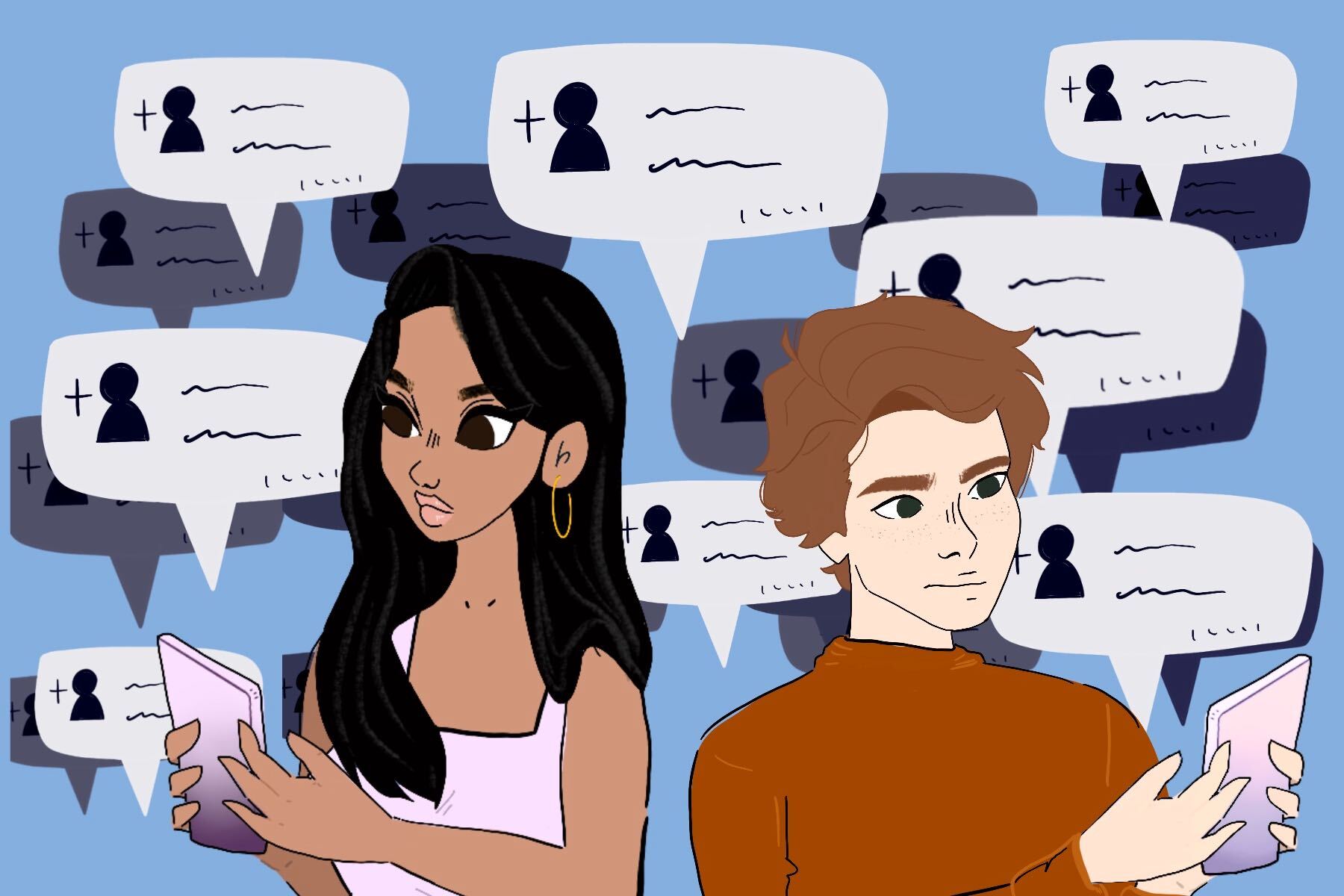The best way to start conversations with new people is to identify things we have in common. We can bond over shared interests, shared experiences, shared emotions and sometimes shared friends. Discussing mutual friends is a great way to break the ice with a new person. Not only can this discovery catalyze conversation, but it can also tell us a little bit more about our conversation partners. However, this neat little hack doesn’t come without its drawbacks.
Though having mutual friends can provide a unique point of entry into a friendship, it can also produce a good amount of anxiety surrounding that relationship. While in one sense, revealing anything about ourselves makes us vulnerable, there is a unique kind of vulnerability that comes from having mutual friends. Many of us might not be comfortable sharing this extra vulnerability with a stranger. Additionally, the social dynamics involved in hanging out with our new and mutual friends together present additional challenges that are difficult to navigate.
Having friends in common can therefore create just as much stress as it relieves.
Why Should We Want Mutual Friends?
A mutual friend is a wellspring of potentially endless conversation. Whereas a conversation about a shared interest could potentially run its course within the limits of the topic, mutual friends provide avenues across different ranges of subjects. Finding a friend in common can lead to discussions about how we met this friend, all the different things we have done with this friend, things they told us, funny stories about them, a discussion of their lives, what we like about them, etc.
The possibilities are as complicated and multi-faceted as the friend we share. In conversations with new people, where the greatest challenge is often conquering an awkward silence, having a mutual friend can be a big relief.
Another common challenge when it comes to meeting new people is how to integrate them into our social lives once we’ve established a one-on-one connection. When the friendship is still new, the prospect of bringing a complete stranger into an interaction with our other friends is awkward. All too often, these relationships wither in a weird limbo state where our only conversations happen during chance encounters. Having a mutual friend is a good way to rescue that relationship by deliberately interacting with a new friend in a lower-stakes context.
Mutual friends also allows us to access additional opinions. While we can learn a lot about people just through conversation, hearing a mutual friend’s impression of the new person we’ve met is often a good way to augment our understanding of them. After we meet a new person, it can be helpful to consult with our mutual friend to cross-check our impressions. Even if we don’t talk to our mutual friends about the new person, the simple fact of their friendship can tell us a good deal about who the new person is, just by virtue of what we know about our existing friend.
The Drawbacks
But there is another side to this coin. Just as having a mutual friend with someone enhances our ability to learn more about them, it enhances their ability to know more about us as well. A mutual friend opens up just as many avenues to our identities as it does to those of our conversation partners. And while ultimately a certain level of vulnerability is necessary to create any relationship, it’s nice to feel as though we can control how much of ourselves we reveal.
Without a mutual friend, we can limit what the other person knows about us. But when they have access to a mutual friend, they can learn things we haven’t explicitly authorized them to know. In a way, we can never really begin with a clean slate if we have mutual friends.
While it is definitely easier to initiate an interaction with someone when a mutual friend can act as a buffer, these interactions are fraught with their own difficulties. Our relationship with our mutual friend and our relationship with this new person will inevitably have different dynamics. We play different roles with different people, and it can often be challenging and stressful to try to play both roles at once.
For example, if our humor with our mutual friend is different than it is with this new person, it can be difficult to strike a balance between the desire to joke around as usual with the old friend and the risk of making the new one uncomfortable. By the same token, being overly cautious and therefore too reserved with the old friend can make them uncomfortable by disrupting an established relational dynamic. In these scenarios, the anxiety associated with introducing two new people is transformed: “Will they like each other?” becomes “Who am I in this interaction?”
There is also some anxiety surrounding our established relationships upon the discovery of mutual friends. Our own relationship with our mutual friend is put into a new perspective. In the first place, since the way we often evaluate social worth is through comparison, we will inevitably compare the relationship our friend has with us with the one they have with this new person. Such comparison can cause us to question the quality of our own relationships.
For example, if we find out our friend shared something with the new person that they hadn’t shared with us, we might begin to doubt how much our mutual friend trusts us. We might also learn new things about our mutual friend that we might not like in the process of seeing them through someone else’s eyes.
When we share friends with a new person, there are more strings attached to including them in our social lives. We wouldn’t be entering into a relationship just with them but with our mutual friend as well. The addition of a new person into an established relationship is likely to cause anxiety as the relationship will have to be renegotiated. For example, without shared friends, we can generally expect that personal information we disclose with someone will be kept between the two of us. This expectation might have to change once a new friend is added to the mix.
It’s a Mix
As is often the case in social scenarios, the dynamics are complicated. Even things that intuitively feel like they should simplify the situation, such as mutual friends, can carry their own complications. Having mutual friends might mitigate some anxieties. But the relationship can definitely produce many others. And while these complications should in no way discourage putting effort into relationships that are worth it, it is useful to remember they exist.
Many of us hold the reductionist view that having mutual friends is an incontrovertible positive. But whenever we simplify real-life complicated phenomena, our understanding of them is clouded. Overlooking potential complications in relational dynamics can make us unprepared to handle or even recognize them when they arise.
If we expect only positives from mutual friendships, the inevitable, awkward impact on our current relationships can be much more devastating, confusing and disappointing.
My friends know me to say that mutual friends are my worst fear. And while this stance may be a tad dramatic, it has served me well as a reminder that the things we assume to be only good can be very complex and even bad. That is, even when life doesn’t turn out perfectly, it wasn’t supposed to anyway.
















